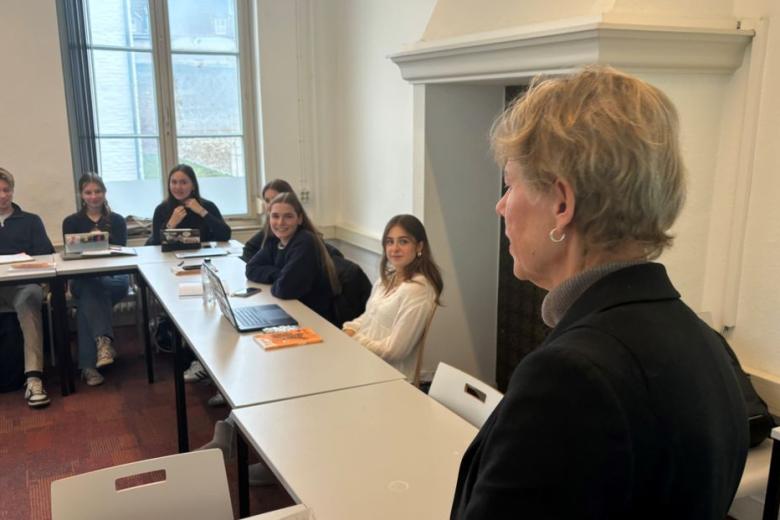Urgent letter to the Minister of Education and the House of Representatives
Appropriate regulations and an international orientation are essential to prevent the devastation of education in Limburg, to maintain education standards and to train sufficient professionals for the tight labour market in the region and in the Netherlands as a whole. Since 2022, Limburg has been among the top 40 of Europe’s most innovative regions, according to the European Commission. To remain at the top and take advantage of new opportunities, education in the province needs to be strengthened. Limburg is calling for the scope and appropriate measures to achieve this. In a broad coalition, municipalities, province, employers’ and employees’ organisations, companies and Maastricht UMC+ are sending an urgent letter today to the education minister and to the parliamentary parties, including the possible partners in a future governing coalition.
At the same time as this urgent letter the educational institutions of Limburg are sending their own manifesto. Both are clear about the threats to education and the region. Due to an aging population in the region, there is a risk of a sharp decline in the influx of students in vocational education and training (MBO), higher professional education (HBO) and university education (WO). If appropriate measures are not taken, the consequences will be devastating: courses will disappear from the region and thus educational institutions will shrink significantly. This will cause a reverse in the positive developments of recent years, such as joint efforts and investments by educational institutions, companies and governments in innovation and knowledge, for example at the Brightlands innovation campuses.
Necessary measures
Both the urgent letter and the manifesto are clear about what is needed to prevent devastation:
- Education funding by the government provided in such a way that shrinking education programmes remain affordable and available in Limburg, including much-needed technical courses.
- Customised legislation and regulations that enable educational institutions to continue to welcome international talent in Limburg in order to address shortages in the labour market and remain an innovative region.
- Structural support for cooperation between the education sector and the regional business community rather than a constant reliance on individual subsidies and tendering schemes that bring high administrative burdens.
- Structural funding of lifelong learning and development programmes by regarding them as part of the public mandate of educational institutions. This will allow Limburg residents to receive the training that is needed in a rapidly changing labour market.
- Better public transport infrastructure within, to and from the region, also to Germany and Belgium.
Due to its location – with two different neighbouring countries and languages just a stone’s throw away – and specific demographic, social and economic characteristics, Limburg is the ideal forerunner for a future-proof education system. This can be achieved through new forms of funding that serve broad regional prosperity and that stimulate cooperation in the chain of education, and connections with social partners and companies.
Disaster scenario averted?
In recent months, the discussion about internationalisation has been largely limited to the influx of international students, especially at universities of applied sciences and research universities. It is now clear that a rigorous end to the influx of international students is completely undesirable. With this it seems that a horror scenario has been averted. Indeed, such a stop would be disastrous: if all bachelor’s programmes at Maastricht University and Zuyd University of Applied Sciences had to be taught in Dutch, it would lead to a permanent loss of some 4,500 jobs and cause the Limburg economy to decline by almost 1 billion euros. This is evident from calculations by the research agency Panteia on behalf of Maastricht University and Zuyd University of Applied Sciences.
Internationalisation is so much more
International orientation goes beyond the admission of international students. The Limburg organisations are now calling attention to the wider story, viewed not merely from the perspective of central government or the Randstad. Internationalisation is not a problem for a region like Limburg, but a solution. Moreover, the problems that exist elsewhere, such as a serious shortage of housing and student accommodation, and overcrowded lecture halls, do not occur in Limburg. In fact, due to demographic shrinkage, municipalities in the region would welcome more students within their boundaries. As stated in the letter: “Only 24 per cent of Limburg’s border is with the rest of the Netherlands, while 76 per cent is with other countries. This means that we have to look beyond borders to increase the quality of life in the region. Partly due to their location in a border region, educational institutions and companies in Limburg have traditionally had a strong international orientation, and they play an important role in the region. Their contribution to the social, economic and cultural development of Limburg is essential.”
Retaining sufficient international students is also essential for the broad prosperity and quality of life in the region, the letter continues. “We – regional government, the business community and educational institutions – want to redouble our efforts to retain foreign students in our region after graduation. [...] strong spectrum of education for our residents is a right that we work hard to uphold. The influx and retention of all talent, young and old, is and will remain indispensable to maintain our region’s competitiveness and quality of life.”
Signatories of the urgent letter
Provincie Limburg | gedeputeerde Elianne Demollin-Schneiders
Gemeente Heerlen | burgemeester Roel Wever
Gemeente Maastricht | burgemeester Wim Hillenaar
Gemeente Roermond | burgemeester Yolanda Hoogtanders
Gemeente Sittard-Geleen | burgemeester Hans Verheijen
Gemeente Venlo | burgemeester Antoin Scholten
Gemeente Weert | burgemeester Raymond Vlecken
Limburgse Werkgevers Vereniging | voorzitter Ron Coenen
MKB-Limburg | voorzitter Martijn van Helvert
FNV Limburg | regioleider Ron van Baden
CNV Limburg, bestuurder Ed Leunissen
Maastricht UMC+| voorzitter Raad van Bestuur Helen Mertens
Brightlands Chemelot Campus | CEO Astrid Boeijen
Brightlands Campus Greenport Venlo | CEO Ingrid Vermeer
Brightlands Maastricht Health Campus | waarnemend CEO Yvo Graus
Brightlands Smart Services Campus | CEO Walter Pijls
Signatories Education Manifesto
MBO
Gilde Opleidingen | Peter Thuis, voorzitter College van Bestuur
VISTA college | Jeanette Oostijen, voorzitter College van Bestuur
Yuverta | Cyrille van Bragt, lid College van Bestuur
HBO
HAS green academy | Reggy van der Wielen, voorzitter College van Bestuur
Zuyd Hogeschool | André Postema, voorzitter College van Bestuur
WO
Open Universiteit| Nicole Ummelen, voorzitter College van Bestuur
Universiteit Maastricht |Rianne Letschert, voorzitter College van Bestuur
Read more about internationalisation
Also read
-
Ronald Janse appointed as new dean of Maastricht University Faculty of Law
The Executive Board of Maastricht University is delighted to announce the appointment of Prof. Ronald Janse as dean of the Faculty of Law.
-
Massimiliano Simons awarded funding for innovative art–science project on hybrid plants
"Entangled Genes: Sharpening the Public Debate on Hybrid Plants” is a new artistic research project that aims to deepen societal reflection on genetically modified plants.
-
HIP makes government communication more human
The ELSA Lab Poverty & Debt is developing, together with HIP, a tool that makes letters easy to understand without compromising their legal validity. HIP stands for Clear, Intelligent, and Productive and was developed in collaboration with the Brightlands Smart Services Campus and PNA Group.



